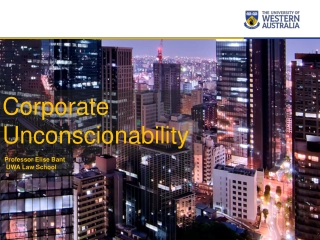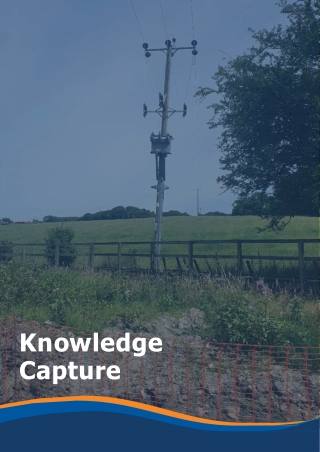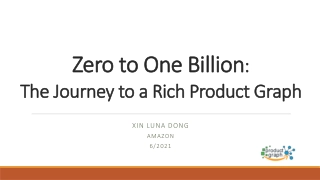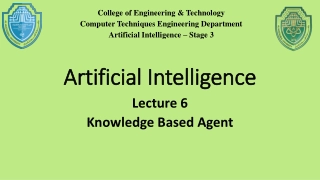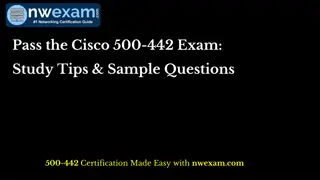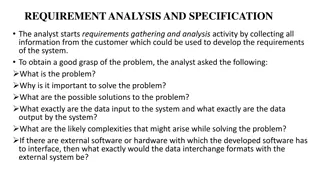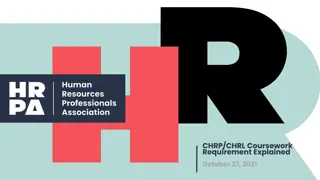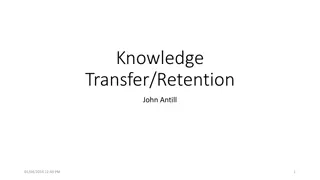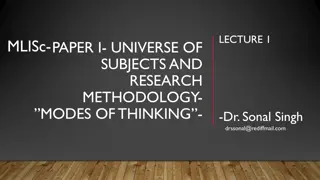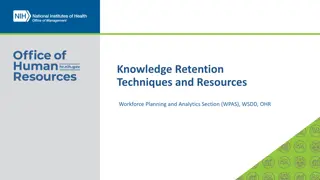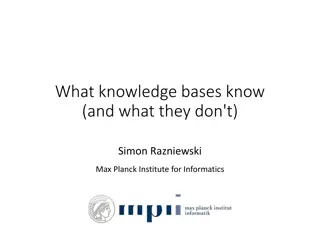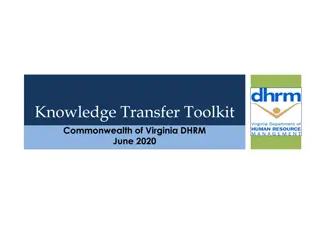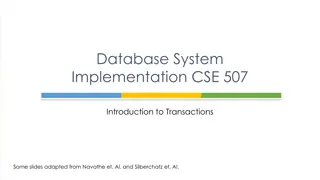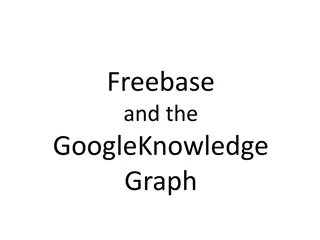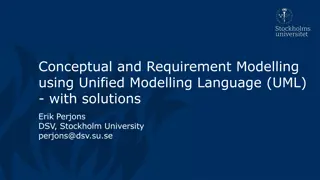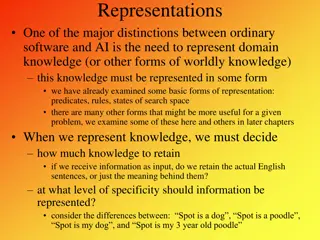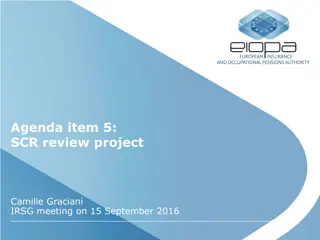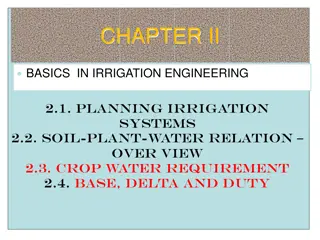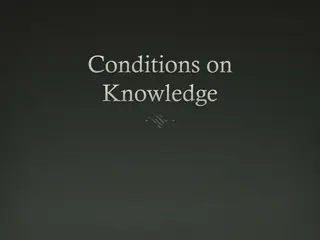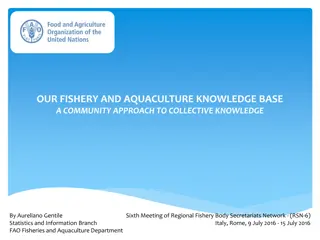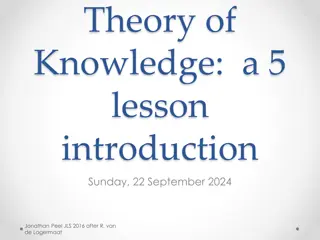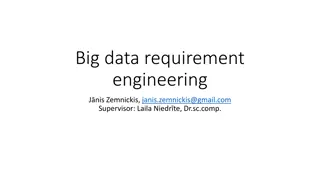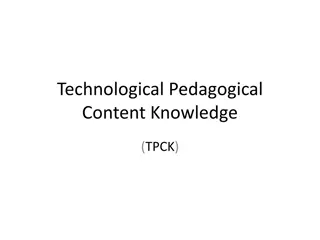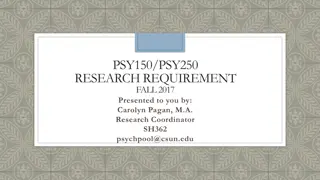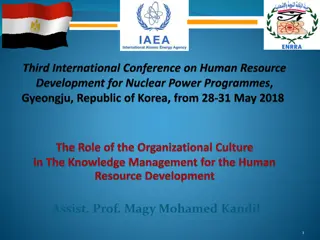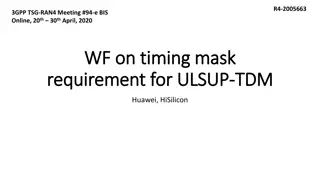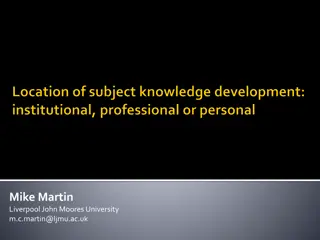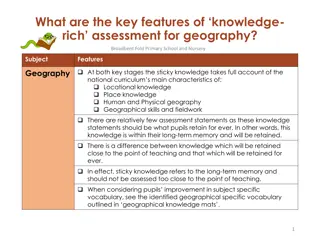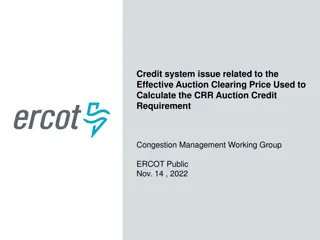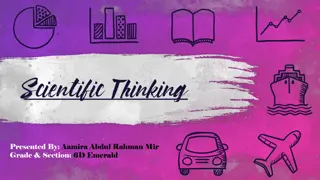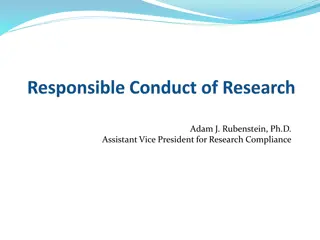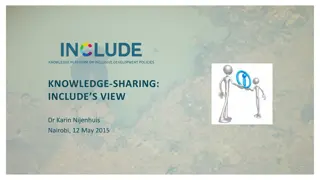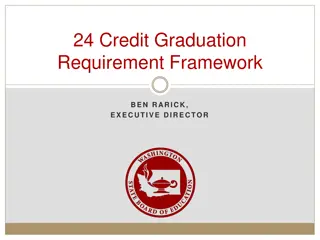Corporate Unconscionability
The concept of corporate unconscionability, including the exploitation of individuals in a special disadvantage. It explores the requirement of knowledge in cases of exploitation, such as actual knowledge, wilful blindness, recklessness, constructive knowledge, and constructive notice.
0 views • 18 slides
Knowledge Capture
Knowledge capture is crucial for organizations to retain valuable expertise and prevent loss of critical knowledge due to employee turnover. Tacit and explicit knowledge play key roles, requiring strategic planning for retention, incentivizing knowledge-sharing culture, and implementing effective st
0 views • 6 slides
Exploring Product and Knowledge Graphs for Enhanced Information Retrieval
Dive into the world of product and knowledge graphs, uncovering the journey to a rich product graph, examples of knowledge graphs for songs, and the mission to provide comprehensive information on products and related knowledge. Discover use cases ranging from information provision to enhancing sear
3 views • 76 slides
Understanding Knowledge-Based Agents in Artificial Intelligence
Knowledge-Based Agents in AI utilize logic and knowledge representation to accept tasks, learn, and adapt to changing environments. Logic plays a crucial role in forming complex world representations and deriving actions based on inference. The central component is the Knowledge Base (KB), represent
4 views • 19 slides
Understanding Knowledge Management: Processes and Frameworks 2. In knowledge management, organizations create, share, and manage knowledge to enhance performance. It involves acquiring different types of knowledge through various means, such as perc
Knowledge Management, Organizational Objectives, Types of Knowledge, Tacit Knowledge, Explicit Knowledge
1 views • 17 slides
Pass the Cisco 500-442 Exam: Study Tips & Sample Questions
Begin your journey here at \/\/bit.ly\/3QZlFIZ to gain comprehensive insights into the 500-442 exam guide, essential for cracking the Unified Contact Center Enterprise Specialization requirement for Systems Engineers. Access detailed information about 500-442 tutorials, practice tests, recommended b
2 views • 17 slides
Pedagogical Shift in Physical Science: Constructing Knowledge Through Learner-Centered Experiences
There is a significant pedagogical shift in physical science education from viewing science as a fixed body of knowledge to emphasizing the process of constructing knowledge. Learners are now placed at the center stage, engaging in inquiry-based learning, critical thinking, and collaborative interac
3 views • 21 slides
Software Requirement Analysis and Documentation Process
The requirement analysis and specification process involves gathering information from customers, identifying the problem, solutions, data requirements, complexities, and potential interfaces. Key components of a Software Requirements Specification (SRS) document include functional requirements, non
0 views • 23 slides
HRPA Fall 2021 Webinar Series: CHRP/CHRL Coursework Explained
Explore the CHRP/CHRL Coursework Requirement explained in the HRPA Fall 2021 Webinar Series. Gain insights on meeting the Coursework Requirement, Certification Framework, and more to achieve Certified Human Resources Executive (CHRE) Designation. Discover the importance of certification in promoting
0 views • 23 slides
Importance of Knowledge Retention in Organizations
Organizations face negative impacts on performance due to the loss of knowledge. Strategies such as exit interviews, mentorship, and knowledge sharing tools are vital for effective knowledge retention. Assessing knowledge retention maturity through various techniques is crucial, aligning with ISO st
0 views • 11 slides
Understanding Modes of Thinking and Knowledge Development
Man's acquisition of knowledge is intricately linked to his ability to think, reason, and perceive. Knowledge is a result of experiences gained through perception, intellect, and intuition. The history of humanity is a story of knowledge acquisition and development, with man at the forefront as the
1 views • 18 slides
Effective Knowledge Retention Strategies in Workforce Planning and Analytics
Retaining knowledge is crucial for organizations to enhance customer service, foster innovation, improve efficiency, and bridge skill gaps. This article explores the significance of knowledge retention, the types of knowledge essential for succession planning, and two effective strategies - the Know
1 views • 10 slides
Exploring Knowledge Base Construction and Commonsense Knowledge in Fiction
Delve into innovative research interests focusing on knowledge base construction using fictional texts as archetypes, taxonomies for constructing knowledge bases, and extraction of commonsense knowledge from diverse sources. Challenges such as sparsity and semantics are addressed through comprehensi
3 views • 48 slides
Knowledge Transfer Toolkit for Organizational Success
This toolkit, developed by the Commonwealth of Virginia DHRM in June 2020, covers the essentials of knowledge transfer, including its definition, impact, challenges, and management strategies. It emphasizes aligning knowledge transfer with strategic goals, overcoming barriers through leadership supp
2 views • 15 slides
Understanding Properties of Database Transactions
Database transactions play a crucial role in ensuring data integrity and consistency within a database system. This content explores the fundamental properties of transactions, such as atomicity, durability, consistency, and isolation. It delves into the requirements and implications of each propert
2 views • 44 slides
Evolution of Freebase and the Google Knowledge Graph
Freebase was initially created in 2005 as an open shared database of knowledge, later acquired by Google and absorbed into the Google Knowledge Graph. Its approach included crowdsourcing updates and additions, focusing on data rather than text. The schema of Freebase included around 1500 types, 3500
1 views • 12 slides
Understanding Conceptual and Requirement Modelling Using UML
Enterprise and system models play a crucial role in the business world. This collection of images showcases various aspects of conceptual and requirement modelling using Unified Modelling Language (UML). From business process models to human interactions with software systems, these visual represent
1 views • 92 slides
Understanding Knowledge Representation in Artificial Intelligence
In AI, representing domain knowledge is crucial and comes in various forms like predicates, rules, and search space states. Deciding the level of specificity and form of representation is key. Knowledge can be categorized into procedural, domain, and common sense knowledge, available in forms such a
2 views • 32 slides
Review Project on Solvency Capital Requirement Standard Formula
The agenda item discusses the review project led by Camille Graciani at the IRSG meeting in September 2016. The project aims to enhance the Solvency Capital Requirement standard formula by reducing complexity, correcting technical inconsistencies, and addressing market risks. Key objectives include
1 views • 5 slides
Basics of Crop Water Requirements in Irrigation Engineering
Understanding crop water requirements is crucial in planning effective irrigation systems. Crop water requirements are determined by factors such as evapotranspiration, soil conditions, and achieving maximum production potential. Effective rainfall, soil moisture storage, and groundwater contributio
0 views • 83 slides
Agreements on Core Requirement Maintenance of Direct SCell Activation
Companies provided contributions on core requirement maintenance to RAN4#99-e, focusing on timelines, known conditions, and measurement thresholds for Direct SCell Activation in NR.FRI. This document outlines unresolved issues and agreements reached regarding activation procedures, condition require
0 views • 6 slides
Exploring Epistemology: Understanding Knowledge and Truth
Epistemology delves into the nature of knowledge, understanding, wisdom, and justification, questioning the extent of human knowledge and the different kinds of knowledge. It explores skepticism and conditions on propositional knowledge, discussing whether knowledge implies truth and the debate betw
1 views • 54 slides
Navigating the World of Big Data, Knowledge, and Crowdsourcing
The world has evolved into a data-centric landscape where managing massive amounts of data requires the convergence of big data, big knowledge, and big crowd technologies. This transformation necessitates the utilization of domain knowledge, building knowledge bases, and integrating human input thro
1 views • 5 slides
Enhancing Fisheries and Aquaculture Knowledge for Sustainable Development
The Fishery and Aquaculture Knowledge Base, presented at the Sixth Meeting of Regional Fishery Body Secretariats Network, focuses on collective knowledge exchange in the fisheries and aquaculture sector. This knowledge hub offers a wealth of information on various aspects, supporting Sustainable Dev
0 views • 13 slides
Exploring the Nature of Knowledge in Theory of Knowledge
Delve into the essence of knowledge with Jonathan Peel's introduction to Theory of Knowledge, pondering on how different disciplines perceive knowledge, the impact of empirical questioning, and timeless wisdom on ignorance and progress. Explore the concept of basic knowledge and its implications, in
0 views • 37 slides
Unleashing the Potential of Big Data in Requirement Engineering
Explore the transformative power of big data in requirement engineering, uncovering its impact on industries and society. Discover the challenges faced in utilizing data effectively and the solutions to bridge the gap between analytics and business objectives.
0 views • 19 slides
Understanding Modelling Knowledge and Knowledge Representation
Explore the significance of modelling knowledge through knowledge representation, making it explicit, independent, and reusable. Learn why knowledge representation is essential and how it facilitates exchange, query, inference, and visualization. Delve into examples of knowledge application in vario
0 views • 30 slides
Understanding Technological Pedagogical Content Knowledge (TPCK)
Technological Pedagogical Content Knowledge (TPCK) is a framework developed by Punya Mishra and Matthew J. Koehler that integrates content, pedagogy, and technology for effective teaching. TPCK emphasizes the interaction between these three key components to enhance technology integration in educati
0 views • 55 slides
PSY150/PSY250 Research Requirement Fall 2017 Overview
The PSY150/PSY250 Research Requirement for Fall 2017 provides students with practical experience in psychological research. Over 2,000 students participated in nearly 200 experiments conducted by faculty, graduate students, and upper-level psychology students. Students must complete the research req
0 views • 9 slides
Enhancing Human Resource Development through Knowledge Management
Monitoring and improving human performance in nuclear facilities is a key challenge, with knowledge management playing a crucial role in increasing staff competence. Organizational culture influences knowledge-sharing success. Explore the components of knowledge management, its importance in nuclear
0 views • 17 slides
Discussion on Timing Mask Requirement for ULSUP-TDM in RAN4#94e Meeting
In the RAN4#94e and #94e-Bis meetings, discussions were held on the timing mask requirement for ULSUP-TDM, particularly focusing on sub-topics like evaluating uplink timing differences between LTE and NR, clarifying present time mask conditions, and testing time mask requirements. The key issue cent
0 views • 4 slides
Understanding Subject Knowledge Development in Education
Exploring the complexities of subject knowledge development in education, this study delves into areas such as students' existing knowledge, competencies, and the role of institutions in shaping knowledge acquisition. The focus lies on personalizing knowledge to individual needs rather than a fixed
1 views • 22 slides
Key Features of Knowledge-Rich Assessment in Geography at Broadbent Fold Primary School
Broadbent Fold Primary School emphasizes sticky knowledge in geography assessment focusing on locational knowledge, place knowledge, human and physical geography, and geographical skills. Assessment statements aim to facilitate long-term retention of knowledge, vocabulary acquisition, and fieldwork
0 views • 8 slides
Auction Credit Requirement Issue Impact on ERCOT's CRR Auctions
A software error in the Credit Monitoring and Management system led to incorrect determination of the Effective Auction Clearing Price impacting the Auction Credit Requirement for Congestion Revenue Rights in ERCOT's CRR auctions. The error occurred due to automation in September 2021 and was resolv
0 views • 5 slides
Registered Agents Requirement for Business Entities in Colorado
Colorado law requires every domestic and foreign business entity operating in the state to maintain a registered agent. This agent can be an individual, a domestic entity, or a foreign entity with a place of business in Colorado. The registered agent is authorized to receive legal documents and noti
0 views • 9 slides
The Significance of Scientific Research in Islam
Scientific research in Islam is encouraged as a religious and civilizational requirement, emphasizing the pursuit of knowledge through specialized research. Islam promotes the seeking of wisdom and knowledge, with believers seen as deserving of knowledge found through effort. This pursuit of knowled
0 views • 10 slides
Responsible Conduct of Research (RCR) Training Requirements and Compliance
The Responsible Conduct of Research (RCR) training is essential for graduate students to ensure compliance with institutional policies. Completing the Collaborative Institutional Training Initiative (CITI) basic course is a graduation requirement, emphasizing values like honesty, accuracy, objectivi
0 views • 13 slides
Importance of Requirements Management in Project Success
Requirements management is crucial for project success, involving careful consideration of various requirement types such as functional, performance, constraints, and more. Clear, consistent, and verifiable requirements are essential, along with understanding the origins, impacts, and alternatives f
0 views • 13 slides
Knowledge Sharing and Inclusive Development Policies
Knowledge Platform on Inclusive Development Policies (INCLUDE) focuses on enhancing research utilization in policy-making to foster more inclusive development. It was established in 2012 with the aim of bridging the gap between research and policy processes in African countries. INCLUDE engages expe
0 views • 8 slides
Washington State Board of Education 24 Credit Graduation Requirement Framework
Graduation requirement guiding principles aim to ensure all students receive foundational high school credits, including STEM courses. Postsecondary pathways offer options like CTE programs and pursuing degrees. Stakeholder input suggests creating personalized pathway requirements and expanding the
0 views • 7 slides
